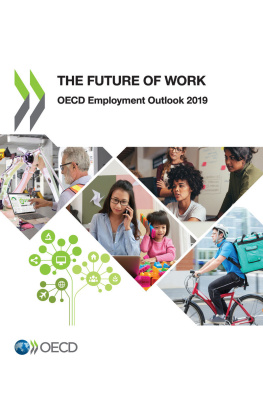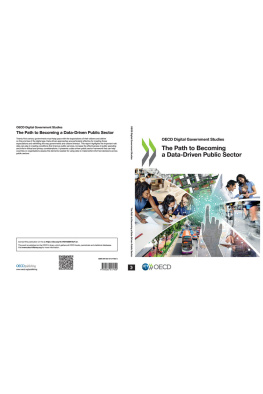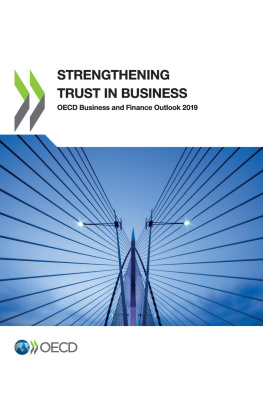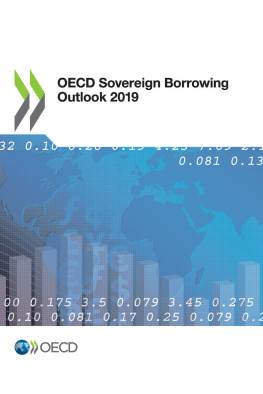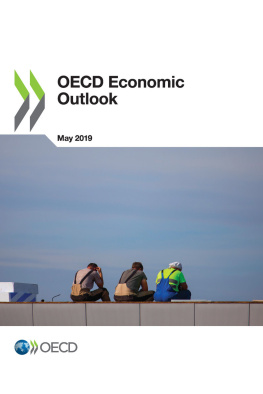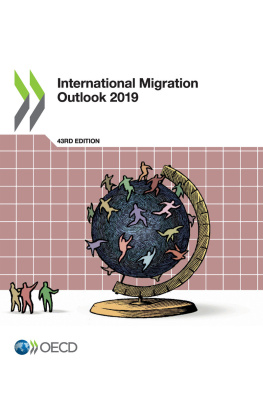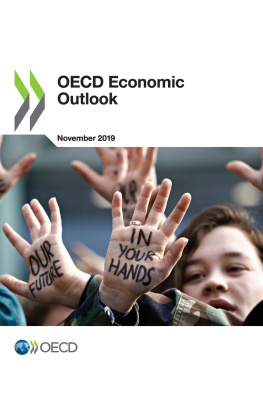OECD - OECD Employment Outlook 2019
Here you can read online OECD - OECD Employment Outlook 2019 full text of the book (entire story) in english for free. Download pdf and epub, get meaning, cover and reviews about this ebook. year: 2019, publisher: OECD Publishing, genre: Politics. Description of the work, (preface) as well as reviews are available. Best literature library LitArk.com created for fans of good reading and offers a wide selection of genres:
Romance novel
Science fiction
Adventure
Detective
Science
History
Home and family
Prose
Art
Politics
Computer
Non-fiction
Religion
Business
Children
Humor
Choose a favorite category and find really read worthwhile books. Enjoy immersion in the world of imagination, feel the emotions of the characters or learn something new for yourself, make an fascinating discovery.
OECD Employment Outlook 2019: summary, description and annotation
We offer to read an annotation, description, summary or preface (depends on what the author of the book "OECD Employment Outlook 2019" wrote himself). If you haven't found the necessary information about the book — write in the comments, we will try to find it.
OECD: author's other books
Who wrote OECD Employment Outlook 2019? Find out the surname, the name of the author of the book and a list of all author's works by series.
OECD Employment Outlook 2019 — read online for free the complete book (whole text) full work
Below is the text of the book, divided by pages. System saving the place of the last page read, allows you to conveniently read the book "OECD Employment Outlook 2019" online for free, without having to search again every time where you left off. Put a bookmark, and you can go to the page where you finished reading at any time.
Font size:
Interval:
Bookmark:
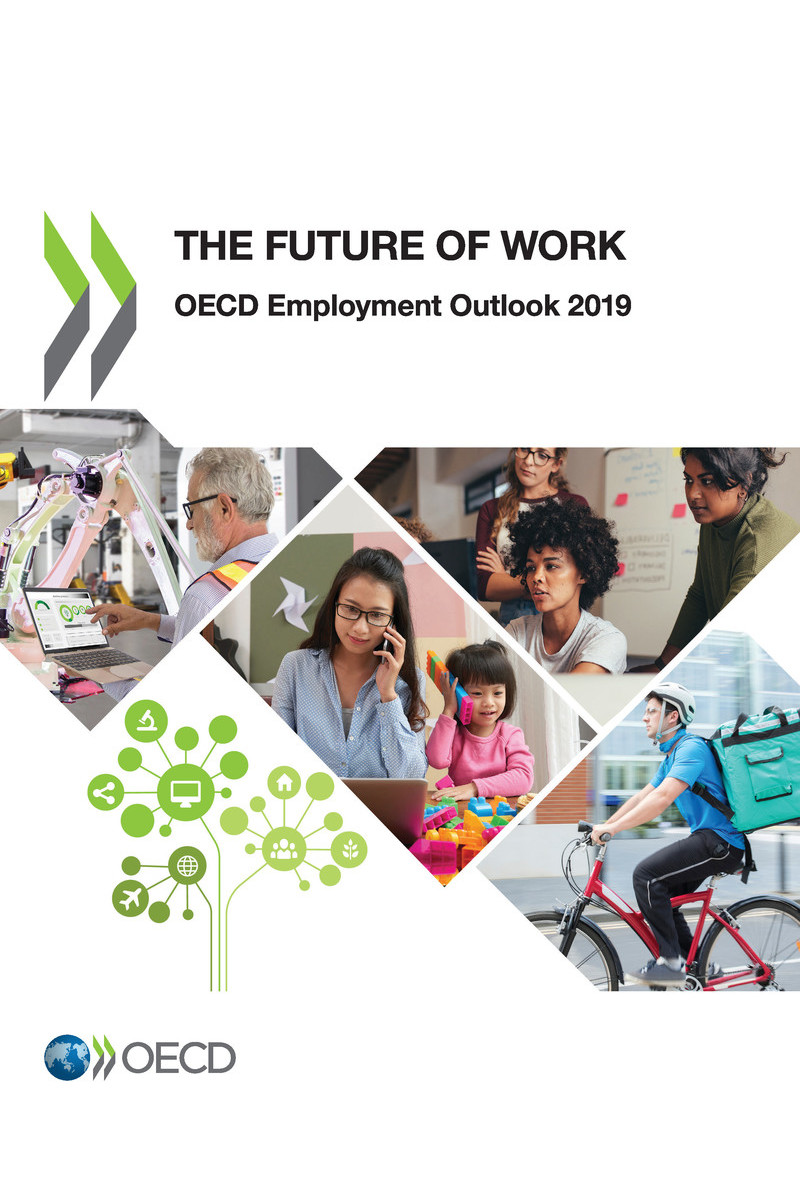
OECD (2019), OECD Employment Outlook 2019: The Future of Work , OECD Publishing, Paris, https://doi.org/10.1787/9ee00155-en .
The world is changing at lightning speed. Digitalisation, globalisation and demographic changes are having a profound impact on our lives, on our cultures, on our societies. These and other megatrends are constantly (and rapidly) transforming the way we interact with our friends and families; how and where businesses operate; what goods and services we consume; what dreams we dream. Our education and health, the distribution of income and wealth, the jobs we have and how we work are all particularly sensitive to these changes. It is a transformational era. Disruption is the new normal.
As any revolution, this one is charged with opportunities. Multilateral co-operation, regional integration and the complex global interdependence that have developed over the past decades, have multiplied these opportunities. The new technologies are game-changers, but now they are also part of our daily lives. More and more people and devices are connecting to the internet, while artificial intelligence is silently spreading. Blockchain and other technologies are also becoming more prevalent across economies and societies. This is amplifying our capacity to promote higher productivity growth, better services, improved well-being; it also allows for new business models and innovative ways of working to emerge, providing more flexibility to both employers and workers.
But there are also challenges, especially for labour. Middle-skilled jobs are increasingly exposed to this profound transformation. We estimate that 14% of existing jobs could disappear as a result of automation in the next 15-20 years, and another 32% are likely to change radically as individual tasks are automated. Many people and communities have been left behind by globalisation and a digital divide persists in access to new technologies resulting in inequalities along age, gender, and socio-economic lines. Not everyone has been able to benefit from the better jobs that have emerged, and many are stuck in precarious working arrangements with little pay and limited or no access to social protection, lifelong learning and collective bargaining. Moreover, there is a very real concern of a hollowing out of the middle-class as technological advancements have been accompanied by the emergence of many lower-quality and precarious jobs. In some countries, for example, non-standard workers are 40-50% less likely than standard employees to receive any form of income support when they are out-of-work. And low-skilled adults across OECD countries, on average, are 40 percentage points less likely than high-skilled adults to participate in training.
Unsurprisingly, these changes result in anxiety about the future. The growth of inequalities of income and opportunities, distortions in cross-border competition, the perception of fiscal unfairness, the risk of climate change and the slowdown of the global economy, are all cause for concern. Disruption also elicits growing discontent about the effectiveness of our systems. A recent OECD survey (Risks that Matter, 2019) shows that many people believe public services and social benefits are inadequate and hard to reach. More than half say they do not receive their fair share of benefits given the taxes they pay, and two-thirds believe others get more than they deserve. Nearly three out of four people say they want their government to do more to protect their social and economic security.
In this challenging context, it is crucial to refocus our attention towards people and well-being. In the digital era, it is important that people feel that they will be supported if they lose out, and helped in their search for new and better opportunities. The pace and speed of this change requires swift and decisive policy action inspired by a new type of growth, one that is more inclusive and more sustainable.
To help governments deliver on this objective, the OECD launched the Inclusive Growth initiative and developed a Framework for Policy Action on Inclusive Growth . This not only helps us to get answers to many of these questions but it crucially offers governments concrete guidance on how to design and implement policies that will give all people, firms and regions the opportunity to thrive particularly those who are struggling or have been left behind. Strong labour market performance is crucial in this goal to achieve inclusive growth.
We also launched the OECDs Future of Work Initiative which, over the past few years, has been looking at how globalisation, technological progress and demographic change are impacting OECD labour markets, and what this means for skills and social policies. The present volume is a key milestone in this effort, and provides policy makers with a thorough diagnosis of the challenges, as well as a detailed set of policy directions for maximising opportunities to create better jobs for all.
The key message of this OECD Employment Outlook is that the future of work is in our hands and will largely depend on the policy decisions countries make. It will be the nature of such policies, our ability to harness the potential of the unprecedented digital and technological change while coping with the challenges it poses, which will determine whether we succeed or fail.
In some policy areas, however, changes at the margin will not be sufficient and an overhaul of current policies might be necessary. Shaping the future of work calls for a Transition Agenda for a Future that Works for All. In this respect, the report highlights the need to help workers in their job transitions through effective and timely employment services as well as prevention and early intervention measures. Looking ahead, countries should focus on putting in place comprehensive adult learning strategies in particular for low-skilled adults to prevent skills depreciation and obsolescence, and facilitate transitions across jobs. Adult learning systems will also need to be strengthened and adapted to provide all workers with adequate opportunities for retraining throughout their careers.
Font size:
Interval:
Bookmark:
Similar books «OECD Employment Outlook 2019»
Look at similar books to OECD Employment Outlook 2019. We have selected literature similar in name and meaning in the hope of providing readers with more options to find new, interesting, not yet read works.
Discussion, reviews of the book OECD Employment Outlook 2019 and just readers' own opinions. Leave your comments, write what you think about the work, its meaning or the main characters. Specify what exactly you liked and what you didn't like, and why you think so.

